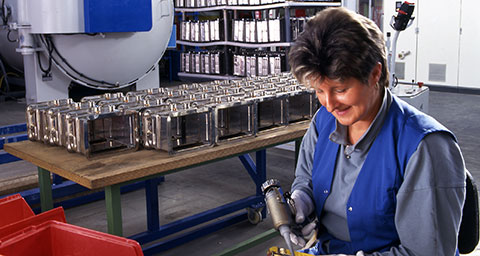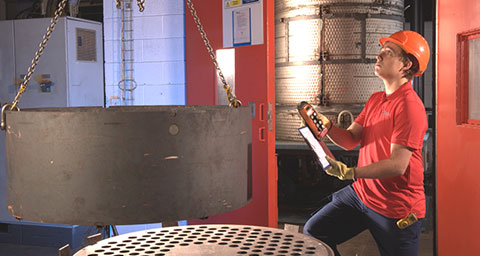Classical Heat Treatment

Virtually every type of metal component, whatever its application, has received some form of processing before its introduction to service to enable it to perform to the required standard and last longer. Working to very exacting quality specifications, heat treatment uses precisely controlled furnaces to process a huge variety of metals and alloys, improving their material properties. Bodycote's Classical Heat Treatments describe a group of mature processes such as nitriding, carburising, annealing, tempering (and many more) that are used to achieve the desired properties.
Below are a few examples of material properties obtained by heat treatment:
Hardness
What is it? The ability of a material to resist deformation, scratching and indentation under force.
Why is it important? Improving a material's hardness through heat treatment allows it to resist various types of wear.
Toughness
What is it? The ability of a material to absorb energy and plastically deform without fracture.
Why is it important? Heat treatment can be used to strengthen the material and help improve its resistance to impact.
Fatigue strength
What is it? The stress level at which component failure occurs when subjected to repeated stress cycles.
Why is it important? Part failure due to fatigue can have catastrophic consequences, particularly if the part is safety critical. Through heat treatment, a material's fatigue strength is improved.
Creep resistance
What is it? The measure of a material's ability to resist high temperature deformation.
Why is it important? Some metals and alloys must operate at temperatures close to their melting point. Heat treatment enables them to perform at higher temperatures with little or no movement.
Ductility
What is it? The ability of a material to deform without breaking.
Why is it important? In order to form or shape a complex component good ductility is required. Heat treatment is used to soften the material which makes it easy to work as part of the manufacturing process.
Specialist Technologies

Bodycote's Specialist Technologies refer to a group of processes which require very specialist expertise and technology. In some cases, they are proprietary technologies which have undergone extensive development and offer unique solutions for a variety of applications.
Hot Isostatic Pressing Services (HIP)
Impact resistance and fatigue properties are extremely sensitive to small amounts of porosity. Through the simultaneous application of heat and pressure, the HIP process eliminates internal porosity, improving fatigue strength, tensile ductility and fracture toughness.
Hot Isostatic Pressing Product Fabrication (HIP PF)
This method combines the HIP process with design and production expertise to create a component from metal powder. The flexibility of the HIP PF process means that combinations of materials can be used to give desired properties, enabling metallic compositions that are difficult or impossible to forge or cast.
Specialty Stainless Steel Processes (S3P)
Steel is often chosen for its inherent corrosion resistance, but often requires hardening. Standard heat treatments will harden the steel, but can negatively impact the corrosion resistance. S3P technology uniquely hardens stainless steel, nickel-based alloys and cobalt-chromium alloys improving mechanical and wear properties without adversely affecting corrosion resistance.
Low Pressure Carburising (LPC)
A case hardening process used to obtain a hardened surface and tough core, giving increased wear resistance and fatigue life, with minimal risk of treatment distortion. LPC is a clean process, carried out under vacuum, and is an environmentally-friendly treatment.
Corr-l-Dur® (CiD)
A proprietary thermochemical treatment for the simultaneous improvement of corrosion and wear resistance through the generation of a nitride-oxide combination layer. Corr-I-Dur® is an environmentally-friendly alternative to the use of hard chromium, electroless nickel and other galvanic coatings.
Surface Technology (ST)
ST incorporates specialised plasma spray, High Velocity Oxygen Fuel (HVOF) and thermo-chemically formed coatings to improve wear resistance, hardness and durability, and is able to surface engineer components designed to operate in the most demanding of industrial applications.
Ion Implantation (I2P)
This unique surface treatment uses macro level ion beams to improve the friction coefficient, adhesive wear and surface hardness; ideally for temperature sensitive materials such as thin metal parts and polymers.